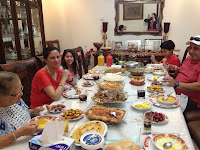With Ramadan approaching, the dilemma for me as a non Muslim was to fast or not to fast? To be honest, I didn't think about it for long and never had a doubt - of course I would fast. Since moving to Doha, I've been determined to assimilate ..... as far as a western, non Muslim, non Arabic speaker can! As regular readers will know, I prefer haggling in the Souq and dancing with the Yemeni boys to drinking with ex-pats in hotel bars and Ive also started learning Arabic.
As all good Muslims know, Ramadan, the most holy of months, is a sunrise to sunset fast - where nothing at all is to pass the lips, including water. It is not simply about food and drink though - Muslims also refrain from smoking, sexual relations, swearing and sinful thoughts - in fact colleagues at work also refrain from being critical of others and try to stay calm and use the time for quiet reflection and further prayer. Ramadan lasts a month and is based on the sightings of the crescent moon.
In practical terms, in Doha, many venues close for the entire month - particularly those which offer alcohol and others only open after 7pm. Even the shopping malls pretty much close down between 1pm and 7pm - but they make up for it by being open until 2am!.... and the atmosphere is wonderful then - with families all coming out to play after their evening Iftar (breakfast). Working hours are also reduced - Al Jazeera move to a 6 hour working day and they have a Ramadan tent which offers employees Iftar at 6.30pm into the evening (see photo).
So on 10th July at 3am, I got up and had my first Suhoor, (the meal consumed before fajr (dawn)) - which for me is porridge with milk, bananas and chopped dates and a black lady grey tea! There are no strict guidelines to when or what you should eat for Suhoor, as long as it takes place before the first prayer of the day (At the moment, this is around 3.30am) .... Some colleagues of mine stay up til midnight or 1am and have their Suhoor then, and at 3am they drink alot of water.
I've been setting my Suhoor alarm every day for a couple of weeks now and I quite enjoy it. I have my porridge, and then spend a few moments standing on the balcony listening to the call to prayer - which is magical at that time of the morning, and then spent the next 15 hours consuming nothing at all until around 6.30pm when I hear the call to prayer and prepare my Iftar.
 I follow tradition in breaking my fast with three dates, as Muhammad did. I have mine with three spoons of yogurt. Muslims will usually then go to pray before starting the next course, which for most people Ive spoken to is soup. It is supposed to help the stomach open up and prepare it to receive more food. This was also what I had with Raeda (a work colleague) and her family when I went there for what I can only describe as proper full on Iftar - absolutely amazing spread of food!! Normally, at home, I would follow the dates with a small salad and then have something a little later such as rice and lentils or noodles.
I follow tradition in breaking my fast with three dates, as Muhammad did. I have mine with three spoons of yogurt. Muslims will usually then go to pray before starting the next course, which for most people Ive spoken to is soup. It is supposed to help the stomach open up and prepare it to receive more food. This was also what I had with Raeda (a work colleague) and her family when I went there for what I can only describe as proper full on Iftar - absolutely amazing spread of food!! Normally, at home, I would follow the dates with a small salad and then have something a little later such as rice and lentils or noodles.Iftar with Raeda's family was so wonderful - but because we hadn't eaten for 15 hours, it was difficult to eat much of what they had prepared, despite the fact that it was all so delicious. All the nations of the world were represented - Lasagna and Cannelloni, Cauliflower cheese, Arabic wheat based dishes with chicken, tomato and bean based dish, homous and flat bread, and something which Ive never had before - fresh dates! They were gorgeous and so sweet! Then later after much resting and looking at some family photos, they brought out some traditional arabic pastries then fruit salad - it really was like Christmas.....well in terms of the amount of food and the generosity and warmth.
Afterwards, Raeda and I went out to the local hypermarket and had some fun window shopping for dresses and jewellery and then did some food shopping - which is not so easy when you've eaten alot!!











